 In a major relief for app-based taxi services in the capital, the High Court on Wednesday suggested that the Delhi government do away with its ban on such cab service providers, while observing that they can hardly be blamed for the illegal acts of the taxi drivers, who have been given All India permits (AIP) by the authorities concerned.
In a major relief for app-based taxi services in the capital, the High Court on Wednesday suggested that the Delhi government do away with its ban on such cab service providers, while observing that they can hardly be blamed for the illegal acts of the taxi drivers, who have been given All India permits (AIP) by the authorities concerned.The bench further observed that the Delhi government had “not been able to keep up with the technology” and had failed to create appropriate rules for web-based taxi services, and suggested that the government could “give a comprehensive hearing” to the licence applications filed by various app-based service providers.
The bench, however, did not issue any oral or written orders, but merely made suggestions while directing the counsel for Ola cabs, an app-based taxi service provider, to “take instructions” on the issue of whether the cabs operated by them were diesel-based or CNG-based cars.
The bench of Justice Manmohan told the counsel for Ola cabs that it was inclined to allow only CNG-based cabs to provide service in the national capital.
“If AIP was given to wrong person, he (OLA) is not to be blamed. You can’t put burden on him (OLA) if AIP was given to a criminal. The cross has to be borne by police and government,” Justice Manmohan said, and added, “But CNG requirement has to be complied with.”
The court noted that under the directions of the Supreme court of India, public service vehicles in Delhi could only be CNG-based.
“If it is point-to-point in Delhi, the cab has to run on CNG. I am very clear about it. Your competitors run on CNG, so how can you run on diesel? Run on CNG or not at all,” the judge said.
The court suggested that the Delhi government do away with the ban on such service providers as their technology has been working across the world, is well-recognised and is a “boon for consumers”, and to hear them afresh on their plea to allow them to ply.
While appreciating the benefits of using app-based taxi services, like the presence of GPS for tracking purposes, reduction in number of private vehicles due to faster and cheaper availability of taxis and their employment potential, the court emphasised that vehicles plying under this technology have to run on CNG.
“Prima facie, I am not going to allow diesel vehicles to run in Delhi through this methodology (of app-based cab service). You see, pollution levels are rising in the city,” it said.
| http://www.taxicar.in/ |
- See more at: http://indianexpress.com/article/cities/delhi/do-away-with-ban-on-app-based-taxi-services-in-delhi-says-hc/#sthash.ra8WXa0o.dpuf
In
a major relief for app-based taxi services in the capital, the High
Court on Wednesday suggested that the Delhi government do away with its
ban on such cab service providers, while observing that they can hardly
be blamed for the illegal acts of the taxi drivers, who have been given
All India permits (AIP) by the authorities concerned.
The bench further observed that the Delhi government had “not been able to keep up with the technology” and had failed to create appropriate rules for web-based taxi services, and suggested that the government could “give a comprehensive hearing” to the licence applications filed by various app-based service providers.
The bench, however, did not issue any oral or written orders, but merely made suggestions while directing the counsel for Ola cabs, an app-based taxi service provider, to “take instructions” on the issue of whether the cabs operated by them were diesel-based or CNG-based cars.
The bench of Justice Manmohan told the counsel for Ola cabs that it was inclined to allow only CNG-based cabs to provide service in the national capital.
“If AIP was given to wrong person, he (OLA) is not to be blamed. You can’t put burden on him (OLA) if AIP was given to a criminal. The cross has to be borne by police and government,” Justice Manmohan said, and added, “But CNG requirement has to be complied with.”
The court noted that under the directions of the Supreme court of India, public service vehicles in Delhi could only be CNG-based.
“If it is point-to-point in Delhi, the cab has to run on CNG. I am very clear about it. Your competitors run on CNG, so how can you run on diesel? Run on CNG or not at all,” the judge said.
The court suggested that the Delhi government do away with the ban on such service providers as their technology has been working across the world, is well-recognised and is a “boon for consumers”, and to hear them afresh on their plea to allow them to ply.
While appreciating the benefits of using app-based taxi services, like the presence of GPS for tracking purposes, reduction in number of private vehicles due to faster and cheaper availability of taxis and their employment potential, the court emphasised that vehicles plying under this technology have to run on CNG.
“Prima facie, I am not going to allow diesel vehicles to run in Delhi through this methodology (of app-based cab service). You see, pollution levels are rising in the city,” it said.
The bench further observed that the Delhi government had “not been able to keep up with the technology” and had failed to create appropriate rules for web-based taxi services, and suggested that the government could “give a comprehensive hearing” to the licence applications filed by various app-based service providers.
The bench, however, did not issue any oral or written orders, but merely made suggestions while directing the counsel for Ola cabs, an app-based taxi service provider, to “take instructions” on the issue of whether the cabs operated by them were diesel-based or CNG-based cars.
The bench of Justice Manmohan told the counsel for Ola cabs that it was inclined to allow only CNG-based cabs to provide service in the national capital.
“If AIP was given to wrong person, he (OLA) is not to be blamed. You can’t put burden on him (OLA) if AIP was given to a criminal. The cross has to be borne by police and government,” Justice Manmohan said, and added, “But CNG requirement has to be complied with.”
The court noted that under the directions of the Supreme court of India, public service vehicles in Delhi could only be CNG-based.
“If it is point-to-point in Delhi, the cab has to run on CNG. I am very clear about it. Your competitors run on CNG, so how can you run on diesel? Run on CNG or not at all,” the judge said.
The court suggested that the Delhi government do away with the ban on such service providers as their technology has been working across the world, is well-recognised and is a “boon for consumers”, and to hear them afresh on their plea to allow them to ply.
While appreciating the benefits of using app-based taxi services, like the presence of GPS for tracking purposes, reduction in number of private vehicles due to faster and cheaper availability of taxis and their employment potential, the court emphasised that vehicles plying under this technology have to run on CNG.
“Prima facie, I am not going to allow diesel vehicles to run in Delhi through this methodology (of app-based cab service). You see, pollution levels are rising in the city,” it said.
Do you
- See more at:
http://indianexpress.com/article/cities/delhi/do-away-with-ban-on-app-based-taxi-services-in-delhi-says-hc/#sthash.ra8WXa0o.dpuf
In
a major relief for app-based taxi services in the capital, the High
Court on Wednesday suggested that the Delhi government do away with its
ban on such cab service providers, while observing that they can hardly
be blamed for the illegal acts of the taxi drivers, who have been given
All India permits (AIP) by the authorities concerned.
The bench further observed that the Delhi government had “not been able to keep up with the technology” and had failed to create appropriate rules for web-based taxi services, and suggested that the government could “give a comprehensive hearing” to the licence applications filed by various app-based service providers.
The bench, however, did not issue any oral or written orders, but merely made suggestions while directing the counsel for Ola cabs, an app-based taxi service provider, to “take instructions” on the issue of whether the cabs operated by them were diesel-based or CNG-based cars.
The bench of Justice Manmohan told the counsel for Ola cabs that it was inclined to allow only CNG-based cabs to provide service in the national capital.
“If AIP was given to wrong person, he (OLA) is not to be blamed. You can’t put burden on him (OLA) if AIP was given to a criminal. The cross has to be borne by police and government,” Justice Manmohan said, and added, “But CNG requirement has to be complied with.”
The court noted that under the directions of the Supreme court of India, public service vehicles in Delhi could only be CNG-based.
“If it is point-to-point in Delhi, the cab has to run on CNG. I am very clear about it. Your competitors run on CNG, so how can you run on diesel? Run on CNG or not at all,” the judge said.
The court suggested that the Delhi government do away with the ban on such service providers as their technology has been working across the world, is well-recognised and is a “boon for consumers”, and to hear them afresh on their plea to allow them to ply.
While appreciating the benefits of using app-based taxi services, like the presence of GPS for tracking purposes, reduction in number of private vehicles due to faster and cheaper availability of taxis and their employment potential, the court emphasised that vehicles plying under this technology have to run on CNG.
“Prima facie, I am not going to allow diesel vehicles to run in Delhi through this methodology (of app-based cab service). You see, pollution levels are rising in the city,” it said.
The bench further observed that the Delhi government had “not been able to keep up with the technology” and had failed to create appropriate rules for web-based taxi services, and suggested that the government could “give a comprehensive hearing” to the licence applications filed by various app-based service providers.
The bench, however, did not issue any oral or written orders, but merely made suggestions while directing the counsel for Ola cabs, an app-based taxi service provider, to “take instructions” on the issue of whether the cabs operated by them were diesel-based or CNG-based cars.
The bench of Justice Manmohan told the counsel for Ola cabs that it was inclined to allow only CNG-based cabs to provide service in the national capital.
“If AIP was given to wrong person, he (OLA) is not to be blamed. You can’t put burden on him (OLA) if AIP was given to a criminal. The cross has to be borne by police and government,” Justice Manmohan said, and added, “But CNG requirement has to be complied with.”
The court noted that under the directions of the Supreme court of India, public service vehicles in Delhi could only be CNG-based.
“If it is point-to-point in Delhi, the cab has to run on CNG. I am very clear about it. Your competitors run on CNG, so how can you run on diesel? Run on CNG or not at all,” the judge said.
The court suggested that the Delhi government do away with the ban on such service providers as their technology has been working across the world, is well-recognised and is a “boon for consumers”, and to hear them afresh on their plea to allow them to ply.
While appreciating the benefits of using app-based taxi services, like the presence of GPS for tracking purposes, reduction in number of private vehicles due to faster and cheaper availability of taxis and their employment potential, the court emphasised that vehicles plying under this technology have to run on CNG.
“Prima facie, I am not going to allow diesel vehicles to run in Delhi through this methodology (of app-based cab service). You see, pollution levels are rising in the city,” it said.
Do you
- See more at:
http://indianexpress.com/article/cities/delhi/do-away-with-ban-on-app-based-taxi-services-in-delhi-says-hc/#sthash.ra8WXa0o.dpuf
In
a major relief for app-based taxi services in the capital, the High
Court on Wednesday suggested that the Delhi government do away with its
ban on such cab service providers, while observing that they can hardly
be blamed for the illegal acts of the taxi drivers, who have been given
All India permits (AIP) by the authorities concerned.
The bench further observed that the Delhi government had “not been able to keep up with the technology” and had failed to create appropriate rules for web-based taxi services, and suggested that the government could “give a comprehensive hearing” to the licence applications filed by various app-based service providers.
The bench, however, did not issue any oral or written orders, but merely made suggestions while directing the counsel for Ola cabs, an app-based taxi service provider, to “take instructions” on the issue of whether the cabs operated by them were diesel-based or CNG-based cars.
The bench of Justice Manmohan told the counsel for Ola cabs that it was inclined to allow only CNG-based cabs to provide service in the national capital.
“If AIP was given to wrong person, he (OLA) is not to be blamed. You can’t put burden on him (OLA) if AIP was given to a criminal. The cross has to be borne by police and government,” Justice Manmohan said, and added, “But CNG requirement has to be complied with.”
The court noted that under the directions of the Supreme court of India, public service vehicles in Delhi could only be CNG-based.
“If it is point-to-point in Delhi, the cab has to run on CNG. I am very clear about it. Your competitors run on CNG, so how can you run on diesel? Run on CNG or not at all,” the judge said.
The court suggested that the Delhi government do away with the ban on such service providers as their technology has been working across the world, is well-recognised and is a “boon for consumers”, and to hear them afresh on their plea to allow them to ply.
While appreciating the benefits of using app-based taxi services, like the presence of GPS for tracking purposes, reduction in number of private vehicles due to faster and cheaper availability of taxis and their employment potential, the court emphasised that vehicles plying under this technology have to run on CNG.
“Prima facie, I am not going to allow diesel vehicles to run in Delhi through this methodology (of app-based cab service). You see, pollution levels are rising in the city,” it said.
The bench further observed that the Delhi government had “not been able to keep up with the technology” and had failed to create appropriate rules for web-based taxi services, and suggested that the government could “give a comprehensive hearing” to the licence applications filed by various app-based service providers.
The bench, however, did not issue any oral or written orders, but merely made suggestions while directing the counsel for Ola cabs, an app-based taxi service provider, to “take instructions” on the issue of whether the cabs operated by them were diesel-based or CNG-based cars.
The bench of Justice Manmohan told the counsel for Ola cabs that it was inclined to allow only CNG-based cabs to provide service in the national capital.
“If AIP was given to wrong person, he (OLA) is not to be blamed. You can’t put burden on him (OLA) if AIP was given to a criminal. The cross has to be borne by police and government,” Justice Manmohan said, and added, “But CNG requirement has to be complied with.”
The court noted that under the directions of the Supreme court of India, public service vehicles in Delhi could only be CNG-based.
“If it is point-to-point in Delhi, the cab has to run on CNG. I am very clear about it. Your competitors run on CNG, so how can you run on diesel? Run on CNG or not at all,” the judge said.
The court suggested that the Delhi government do away with the ban on such service providers as their technology has been working across the world, is well-recognised and is a “boon for consumers”, and to hear them afresh on their plea to allow them to ply.
While appreciating the benefits of using app-based taxi services, like the presence of GPS for tracking purposes, reduction in number of private vehicles due to faster and cheaper availability of taxis and their employment potential, the court emphasised that vehicles plying under this technology have to run on CNG.
“Prima facie, I am not going to allow diesel vehicles to run in Delhi through this methodology (of app-based cab service). You see, pollution levels are rising in the city,” it said.
Do you
- See more at:
http://indianexpress.com/article/cities/delhi/do-away-with-ban-on-app-based-taxi-services-in-delhi-says-hc/#sthash.ra8WXa0o.dpuf
In
a major relief for app-based taxi services in the capital, the High
Court on Wednesday suggested that the Delhi government do away with its
ban on such cab service providers, while observing that they can hardly
be blamed for the illegal acts of the taxi drivers, who have been given
All India permits (AIP) by the authorities concerned.
The bench further observed that the Delhi government had “not been able to keep up with the technology” and had failed to create appropriate rules for web-based taxi services, and suggested that the government could “give a comprehensive hearing” to the licence applications filed by various app-based service providers.
The bench, however, did not issue any oral or written orders, but merely made suggestions while directing the counsel for Ola cabs, an app-based taxi service provider, to “take instructions” on the issue of whether the cabs operated by them were diesel-based or CNG-based cars.
The bench of Justice Manmohan told the counsel for Ola cabs that it was inclined to allow only CNG-based cabs to provide service in the national capital.
“If AIP was given to wrong person, he (OLA) is not to be blamed. You can’t put burden on him (OLA) if AIP was given to a criminal. The cross has to be borne by police and government,” Justice Manmohan said, and added, “But CNG requirement has to be complied with.”
The court noted that under the directions of the Supreme court of India, public service vehicles in Delhi could only be CNG-based.
“If it is point-to-point in Delhi, the cab has to run on CNG. I am very clear about it. Your competitors run on CNG, so how can you run on diesel? Run on CNG or not at all,” the judge said.
The court suggested that the Delhi government do away with the ban on such service providers as their technology has been working across the world, is well-recognised and is a “boon for consumers”, and to hear them afresh on their plea to allow them to ply.
While appreciating the benefits of using app-based taxi services, like the presence of GPS for tracking purposes, reduction in number of private vehicles due to faster and cheaper availability of taxis and their employment potential, the court emphasised that vehicles plying under this technology have to run on CNG.
“Prima facie, I am not going to allow diesel vehicles to run in Delhi through this methodology (of app-based cab service). You see, pollution levels are rising in the city,” it said.
The bench further observed that the Delhi government had “not been able to keep up with the technology” and had failed to create appropriate rules for web-based taxi services, and suggested that the government could “give a comprehensive hearing” to the licence applications filed by various app-based service providers.
The bench, however, did not issue any oral or written orders, but merely made suggestions while directing the counsel for Ola cabs, an app-based taxi service provider, to “take instructions” on the issue of whether the cabs operated by them were diesel-based or CNG-based cars.
The bench of Justice Manmohan told the counsel for Ola cabs that it was inclined to allow only CNG-based cabs to provide service in the national capital.
“If AIP was given to wrong person, he (OLA) is not to be blamed. You can’t put burden on him (OLA) if AIP was given to a criminal. The cross has to be borne by police and government,” Justice Manmohan said, and added, “But CNG requirement has to be complied with.”
The court noted that under the directions of the Supreme court of India, public service vehicles in Delhi could only be CNG-based.
“If it is point-to-point in Delhi, the cab has to run on CNG. I am very clear about it. Your competitors run on CNG, so how can you run on diesel? Run on CNG or not at all,” the judge said.
The court suggested that the Delhi government do away with the ban on such service providers as their technology has been working across the world, is well-recognised and is a “boon for consumers”, and to hear them afresh on their plea to allow them to ply.
While appreciating the benefits of using app-based taxi services, like the presence of GPS for tracking purposes, reduction in number of private vehicles due to faster and cheaper availability of taxis and their employment potential, the court emphasised that vehicles plying under this technology have to run on CNG.
“Prima facie, I am not going to allow diesel vehicles to run in Delhi through this methodology (of app-based cab service). You see, pollution levels are rising in the city,” it said.
Do you
- See more at:
http://indianexpress.com/article/cities/delhi/do-away-with-ban-on-app-based-taxi-services-in-delhi-says-hc/#sthash.ra8WXa0o.dpuf
In
a major relief for app-based taxi services in the capital, the High
Court on Wednesday suggested that the Delhi government do away with its
ban on such cab service providers, while observing that they can hardly
be blamed for the illegal acts of the taxi drivers, who have been given
All India permits (AIP) by the authorities concerned.
The bench further observed that the Delhi government had “not been able to keep up with the technology” and had failed to create appropriate rules for web-based taxi services, and suggested that the government could “give a comprehensive hearing” to the licence applications filed by various app-based service providers.
The bench, however, did not issue any oral or written orders, but merely made suggestions while directing the counsel for Ola cabs, an app-based taxi service provider, to “take instructions” on the issue of whether the cabs operated by them were diesel-based or CNG-based cars.
The bench of Justice Manmohan told the counsel for Ola cabs that it was inclined to allow only CNG-based cabs to provide service in the national capital.
“If AIP was given to wrong person, he (OLA) is not to be blamed. You can’t put burden on him (OLA) if AIP was given to a criminal. The cross has to be borne by police and government,” Justice Manmohan said, and added, “But CNG requirement has to be complied with.”
The court noted that under the directions of the Supreme court of India, public service vehicles in Delhi could only be CNG-based.
“If it is point-to-point in Delhi, the cab has to run on CNG. I am very clear about it. Your competitors run on CNG, so how can you run on diesel? Run on CNG or not at all,” the judge said.
The court suggested that the Delhi government do away with the ban on such service providers as their technology has been working across the world, is well-recognised and is a “boon for consumers”, and to hear them afresh on their plea to allow them to ply.
While appreciating the benefits of using app-based taxi services, like the presence of GPS for tracking purposes, reduction in number of private vehicles due to faster and cheaper availability of taxis and their employment potential, the court emphasised that vehicles plying under this technology have to run on CNG.
“Prima facie, I am not going to allow diesel vehicles to run in Delhi through this methodology (of app-based cab service). You see, pollution levels are rising in the city,” it said.
The bench further observed that the Delhi government had “not been able to keep up with the technology” and had failed to create appropriate rules for web-based taxi services, and suggested that the government could “give a comprehensive hearing” to the licence applications filed by various app-based service providers.
The bench, however, did not issue any oral or written orders, but merely made suggestions while directing the counsel for Ola cabs, an app-based taxi service provider, to “take instructions” on the issue of whether the cabs operated by them were diesel-based or CNG-based cars.
The bench of Justice Manmohan told the counsel for Ola cabs that it was inclined to allow only CNG-based cabs to provide service in the national capital.
“If AIP was given to wrong person, he (OLA) is not to be blamed. You can’t put burden on him (OLA) if AIP was given to a criminal. The cross has to be borne by police and government,” Justice Manmohan said, and added, “But CNG requirement has to be complied with.”
The court noted that under the directions of the Supreme court of India, public service vehicles in Delhi could only be CNG-based.
“If it is point-to-point in Delhi, the cab has to run on CNG. I am very clear about it. Your competitors run on CNG, so how can you run on diesel? Run on CNG or not at all,” the judge said.
The court suggested that the Delhi government do away with the ban on such service providers as their technology has been working across the world, is well-recognised and is a “boon for consumers”, and to hear them afresh on their plea to allow them to ply.
While appreciating the benefits of using app-based taxi services, like the presence of GPS for tracking purposes, reduction in number of private vehicles due to faster and cheaper availability of taxis and their employment potential, the court emphasised that vehicles plying under this technology have to run on CNG.
“Prima facie, I am not going to allow diesel vehicles to run in Delhi through this methodology (of app-based cab service). You see, pollution levels are rising in the city,” it said.
Do you
- See more at:
http://indianexpress.com/article/cities/delhi/do-away-with-ban-on-app-based-taxi-services-in-delhi-says-hc/#sthash.ra8WXa0o.dpuf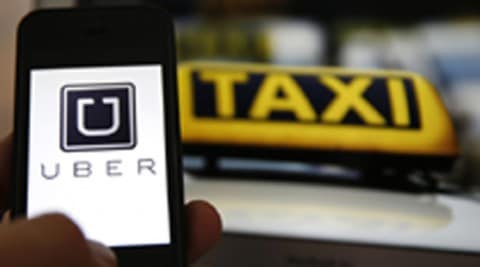
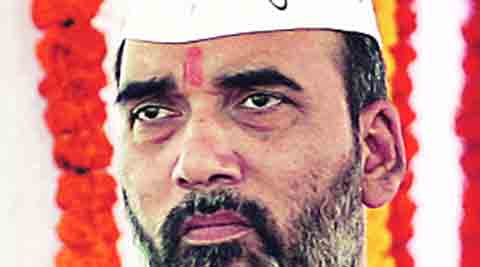
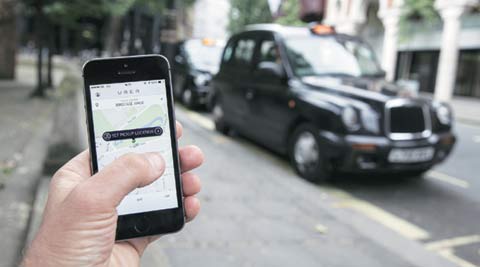
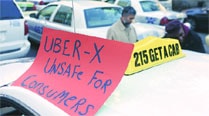
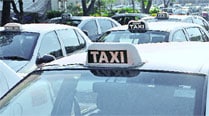
0 comments :
Post a Comment